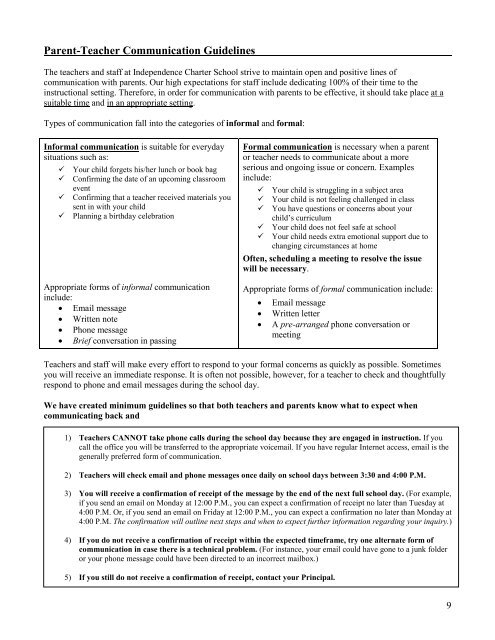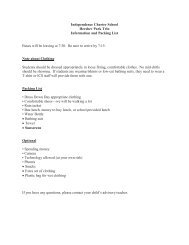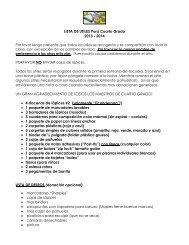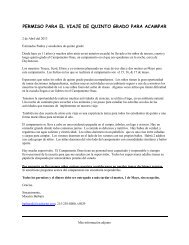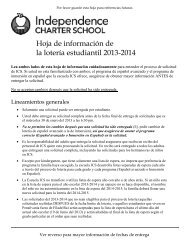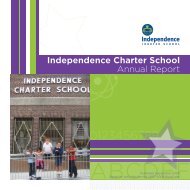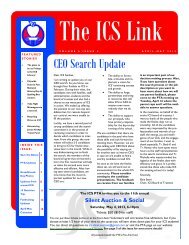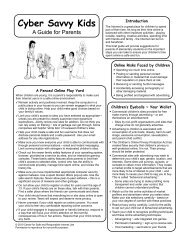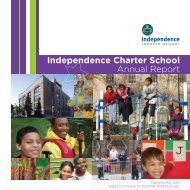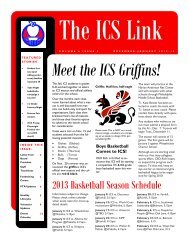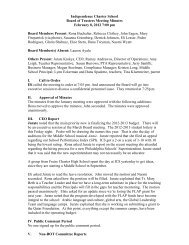Parent & Student Handbook - Independence Charter School
Parent & Student Handbook - Independence Charter School
Parent & Student Handbook - Independence Charter School
You also want an ePaper? Increase the reach of your titles
YUMPU automatically turns print PDFs into web optimized ePapers that Google loves.
<strong>Parent</strong>-Teacher Communication Guidelines<br />
The teachers and staff at <strong>Independence</strong> <strong>Charter</strong> <strong>School</strong> strive to maintain open and positive lines of<br />
communication with parents. Our high expectations for staff include dedicating 100% of their time to the<br />
instructional setting. Therefore, in order for communication with parents to be effective, it should take place at a<br />
suitable time and in an appropriate setting.<br />
Types of communication fall into the categories of informal and formal:<br />
Informal communication is suitable for everyday<br />
situations such as:<br />
Your child forgets his/her lunch or book bag<br />
Confirming the date of an upcoming classroom<br />
event<br />
Confirming that a teacher received materials you<br />
sent in with your child<br />
Planning a birthday celebration<br />
Appropriate forms of informal communication<br />
include:<br />
• Email message<br />
• Written note<br />
• Phone message<br />
• Brief conversation in passing<br />
Formal communication is necessary when a parent<br />
or teacher needs to communicate about a more<br />
serious and ongoing issue or concern. Examples<br />
include:<br />
Your child is struggling in a subject area<br />
Your child is not feeling challenged in class<br />
You have questions or concerns about your<br />
child’s curriculum<br />
Your child does not feel safe at school<br />
Your child needs extra emotional support due to<br />
changing circumstances at home<br />
Often, scheduling a meeting to resolve the issue<br />
will be necessary.<br />
Appropriate forms of formal communication include:<br />
• Email message<br />
• Written letter<br />
• A pre-arranged phone conversation or<br />
meeting<br />
Teachers and staff will make every effort to respond to your formal concerns as quickly as possible. Sometimes<br />
you will receive an immediate response. It is often not possible, however, for a teacher to check and thoughtfully<br />
respond to phone and email messages during the school day.<br />
We have created minimum guidelines so that both teachers and parents know what to expect when<br />
communicating back and<br />
1) Teachers CANNOT take phone calls during the school day because they are engaged in instruction. If you<br />
call the office you will be transferred to the appropriate voicemail. If you have regular Internet access, email is the<br />
generally preferred form of communication.<br />
2) Teachers will check email and phone messages once daily on school days between 3:30 and 4:00 P.M.<br />
3) You will receive a confirmation of receipt of the message by the end of the next full school day. (For example,<br />
if you send an email on Monday at 12:00 P.M., you can expect a confirmation of receipt no later than Tuesday at<br />
4:00 P.M. Or, if you send an email on Friday at 12:00 P.M., you can expect a confirmation no later than Monday at<br />
4:00 P.M. The confirmation will outline next steps and when to expect further information regarding your inquiry.)<br />
4) If you do not receive a confirmation of receipt within the expected timeframe, try one alternate form of<br />
communication in case there is a technical problem. (For instance, your email could have gone to a junk folder<br />
or your phone message could have been directed to an incorrect mailbox.)<br />
5) If you still do not receive a confirmation of receipt, contact your Principal.<br />
9


